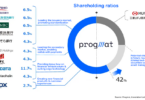Japan’s big three banks, MUFG, SMBC and Mizuho are collaborating on a digital identity solution with two regional banks Fukuoka Financial and Shizuoka, the Nikkei reported. The big three are also backers of the Progmat tokenization solution founded by MUFG.
The aim is for individuals to store data such as their name, address, date of birth and perhaps a driver’s license on their mobile phones as a credential that they can share. DLT ensures that the content has not been tampered with.
Subject to sorting out legal issues, the goal is to start trialing the solution later this year and potentially launch it next year.
They envision using the digital certificates for opening bank accounts, issuing new debit or credit cards and opening accounts to invest in securities.
Proving one’s identity in person is a significant barrier to people signing up for new services. Even when it’s done remotely with a selfie, it’s a painful experience. Hence, there is a need for a digital identity solution, especially a so-called self sovereign identity solution where the user decides with whom and what details they share.
While the benefits of a digital identity solution are clear, there are challenges to overcome. For instance, current Japanese anti-money laundering legislation requires the presentation of a photo ID, which could complicate the implementation of a digital identity solution.
The latest news comes nine months after MUFG joined a cross industry consortium for decentralized identity, DVCC.
Cross bank digital identity elsewhere
Other jurisdictions such as the UAE and Pakistan have launched shared KYC, which isn’t the same, but has a similar objective.
Korea has been one of the jurisdictions to actively explore digital identity. In 2021 it went live with a digital identity initiative for banks in conjunction with the regulator.
A year earlier several Spanish banks collaborated on the Dalion project for blockchain-based digital identity verification. It emerged from Spain’s financial sandbox in 2022, with BBVA joining the following year, meaning Spain’s three largest banks are participants. The project also includes a couple of big insurers. However, we believe it has yet to go into production.






